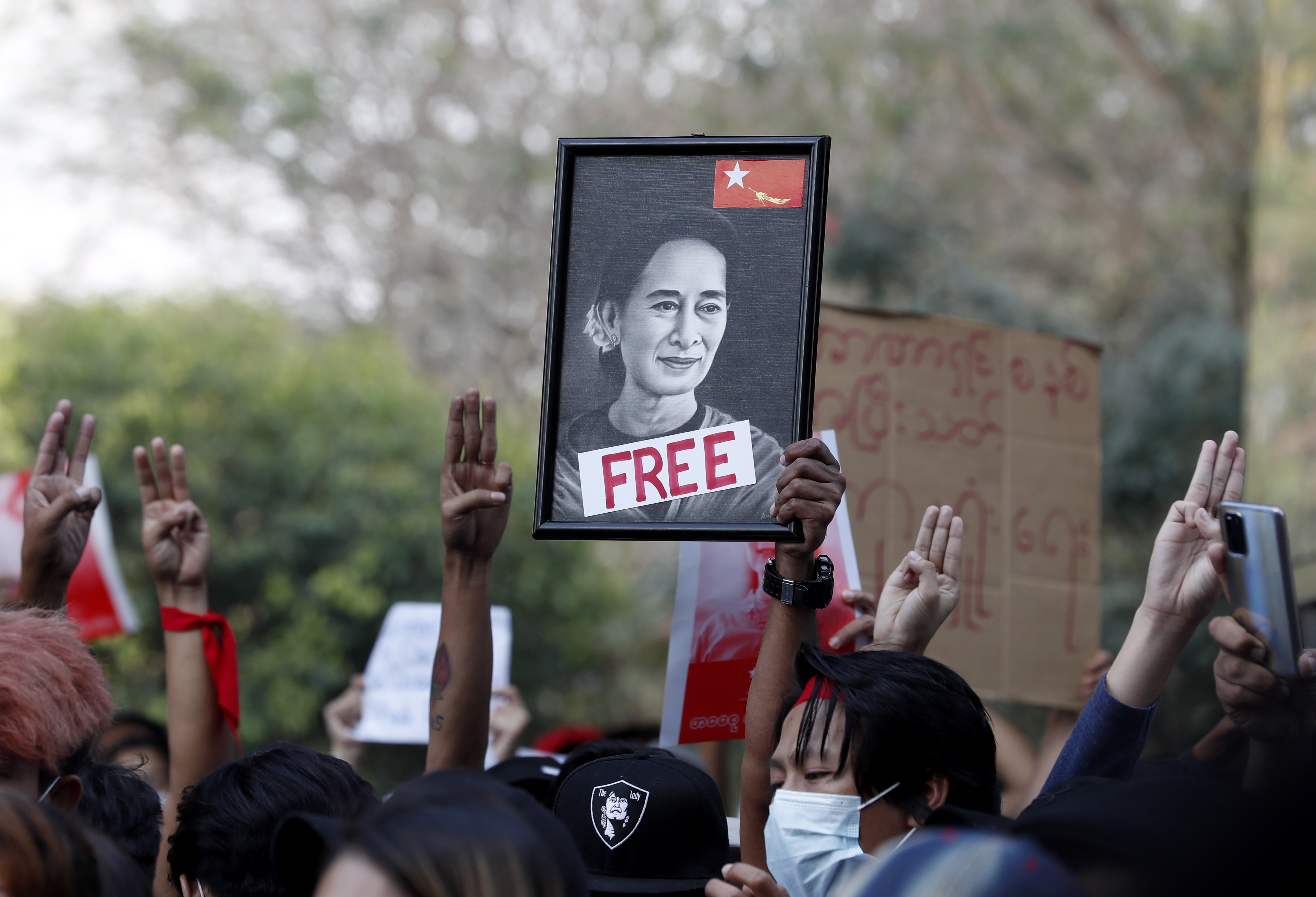Asean needs more detailed plan for Myanmar crisis: Malaysia
Sign up now: Get insights on the biggest stories in Malaysia

Protesters hold a portrait of State Counsellor Aung San Suu Kyi while flashing the three-finger salute, a symbol of resistance, in Yangon, in 2021.
PHOTO: EPA-EFE
SINGAPORE - Malaysia's Foreign Minister Saifuddin Abdullah on Saturday (June 11) said Asean needs a more detailed road map for tackling the Myanmar crisis, suggesting that it sets a time frame and lists the stakeholders in efforts to end the conflict.
This comes as the regional bloc faces a lack of progress in achieving its five-point consensus that was drawn up a year ago.
The consensus calls for Myanmar to end hostilities, initiate dialogue, allow humanitarian support, grant a special envoy full access in the country and allow the envoy to facilitate mediation of the dialogue process.
Speaking at the Shangri-La Dialogue in Singapore, Datuk Seri Saifuddin cited time frame and stakeholders as two missing elements in the current consensus.
"We don't seem to have a time frame (on) when do we get certain things done, who do we meet... The five-point consensus didn't outline who are the stakeholders," he said at a special session on Myanmar: Finding The Way Forward.
In a Facebook post later, Mr Saifuddin said the stakeholders must include ousted leader Aung San Suu Kyi, former president Win Myint, Myanmar's shadow government the National Unity Government (NUG), as well as the National Unity Consultative Council.
He added that humanitarian aid and Covid-19 vaccination must be given top priority, and there must be no hindrance or discrimination against humanitarian and cross-border aid which must include local civil society organisations.
Myanmar has been in chaos since the military seized power from the elected government of Ms Suu Kyi last year.
This sparked widespread protests and unrest that the military has sought to crush by force.
The ousted leader has been sentenced to 11 years in prison, but faces the prospect of more than 100 years on 17 charges.
The NUG, dominated by lawmakers from her National League for Democracy, is working to overturn the coup.
At the forum, Mr Saifuddin also suggested strengthening the role of the Asean special envoy, who is currently Mr Prak Sokhonn, Cambodia's Foreign Minister.
Mr Saifuddin said: "I haven't spoken to my (Asean) colleagues yet but we are meeting informally in Delhi for the Asean-India foreign ministers' meeting on June 16 to 17, and I think in that informal meeting, I will ask my friends to seriously look into how we can strengthen the role of the Asean special envoy."
Another speaker, United Nations' special envoy on Myanmar Noeleen Heyzer, painted a grim picture of the situation there, saying that both the junta and its opponents think they can prevail through the use of violence.
She said the positions of both sides have hardened, with no desire to engage in talks or find a way out of the crisis.
As a result, people's lives and livelihoods have been severely disrupted, with one million displaced internally, villages and civilian infrastructure destroyed and 7.8 million children out of school.
Because of the sufferings, some local leaders feel that changes must be made, said Dr Heyzer.
"They've asked me to establish a platform on greater inclusive dialogue to address problems that need to be resolved such as the humanitarian situation and the need to protect women and children," she said.
Counsellor of the US State Department Derek Chollet told the forum that Myanmar remains a top priority for the United States and it seeks to support Myanmar's democracy and put political and economic pressure on the junta.
"The road ahead is going to be very difficult, there won't be any silver bullets," he said.
"We must remain focused on supporting the people of Myanmar and their struggle to put their country on the path to democracy."
However, special Thai envoy for Myanmar Pornpimol Kanchanalak said punitive measures such as sanctions and ostracism have diminishing returns.
She added that since the junta has announced that it will hold elections in August next year, benefit of the doubt must be given to it for the sake of moving the peace process forward.
"We must take it at face value, to suspend our disbelief and work from there in good faith.
"Efforts must be made to create a mutual space to bring all the stakeholders together to identify the necessary conditions for the intended outcome," she said.
"The process may take two steps forward and one step back, but patience is required as long as it's moving in (the) right direction."


